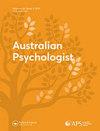The management of insomnia by Australian psychologists: a qualitative study
IF 2
4区 心理学
Q2 PSYCHOLOGY, MULTIDISCIPLINARY
引用次数: 4
Abstract
ABSTRACT Objective Although clinical guidelines recommend Cognitive Behavioural Therapy for insomnia (CBTi) as the first-line treatment for insomnia, many people with insomnia do not have access to CBTi and are prescribed sedative-hypnotic medicines by medical health professionals. Psychologists have training in CBT and may be well placed to deliver behavioural therapy for insomnia. However, the current treatment of insomnia, amount of sleep-specific training and knowledge of CBTi among Australian psychologists remains unknown. Method This qualitative study conducted semi-structured interviews with Australian psychologists. Interviews included case study scenarios to provide an in-depth exploration of psychologists’ knowledge and skills in the management of insomnia. Interview transcripts were analysed using thematic analysis to identify themes. Results Twenty-six psychologists participated in this study. Four themes were identified in the data: 1) Sleep is important but rarely a treatment priority; 2) Confusion about funding pathways discourages treatment of insomnia; 3) A variety of approaches are used in the management of insomnia; 4) Psychologists with experience in CBTi are rare. Conclusions Most Australian psychologists are not well equipped to manage insomnia effectively with CBTi. Along with other primary health care professionals, psychologists need training in the delivery of evidence-based insomnia treatment. KEY POINTS What is already known about this topic: The recommended treatment for insomnia is Cognitive Behavioural Therapy for insomnia (CBTi) but most people with insomnia do not receive this treatment The most common treatments for insomnia are sedative hypnotic medications and sleep hygiene education Most people with insomnia are not referred to a psychologist. What this topic adds: Most psychologists and other primary care professionals lack specific knowledge and training in insomnia and CBTi Insomnia is often regarded as a secondary problem and clients are not usually referred to psychologists for treatment of insomnia Psychologists use a range of treatments for insomnia, most common are sleep hygiene and relaxation.澳大利亚心理学家对失眠的管理:一项定性研究
摘要目的尽管临床指南建议将失眠认知行为疗法(CBTi)作为失眠的一线治疗方法,但许多失眠患者无法获得CBTi,而是由医疗卫生专业人员开具镇静催眠药物。心理学家受过CBT培训,可能适合提供失眠的行为疗法。然而,澳大利亚心理学家目前对失眠的治疗、针对睡眠的训练量和CBTi的知识仍然未知。方法对澳大利亚心理学家进行半结构化访谈。访谈包括案例研究场景,以深入探索心理学家在失眠管理方面的知识和技能。访谈记录采用主题分析法进行分析,以确定主题。结果26名心理学家参与了本研究。数据中确定了四个主题:1)睡眠很重要,但很少是治疗的优先事项;2) 对资金途径的困惑阻碍了失眠的治疗;3) 失眠的治疗方法多种多样;4) 有CBTi经验的心理学家很少。结论大多数澳大利亚心理学家不具备使用CBTi有效治疗失眠的能力。与其他初级卫生保健专业人员一样,心理学家需要接受循证失眠治疗方面的培训。关键点关于这个话题已经知道的内容:推荐的失眠治疗方法是失眠认知行为疗法(CBTi),但大多数失眠患者没有接受这种治疗。失眠最常见的治疗方法是镇静催眠药物和睡眠卫生教育。大多数失眠患者都没有咨询心理医生。本主题补充道:大多数心理学家和其他初级保健专业人员缺乏失眠方面的特定知识和培训,CBTi失眠通常被视为次要问题,客户通常不会被转介给心理学家治疗失眠。心理学家对失眠使用了一系列治疗方法,最常见的是睡眠卫生和放松。
本文章由计算机程序翻译,如有差异,请以英文原文为准。
求助全文
约1分钟内获得全文
求助全文
来源期刊

Australian Psychologist
PSYCHOLOGY, MULTIDISCIPLINARY-
CiteScore
3.70
自引率
5.30%
发文量
32
期刊介绍:
The Australian Psychologist is the official applied practice and public policy journal of the Australian Psychological Society. As such, the journal solicits articles covering current issues in psychology, the science and practice of psychology, and psychology"s contribution to public policy, with particular emphasis on the Australian context. Periodically, Australian Psychological Society documents, including but not limited to, position papers, reports of the Society, ethics information, surveys of the membership, announcements, and selected award addresses may appear in the journal.
 求助内容:
求助内容: 应助结果提醒方式:
应助结果提醒方式:


